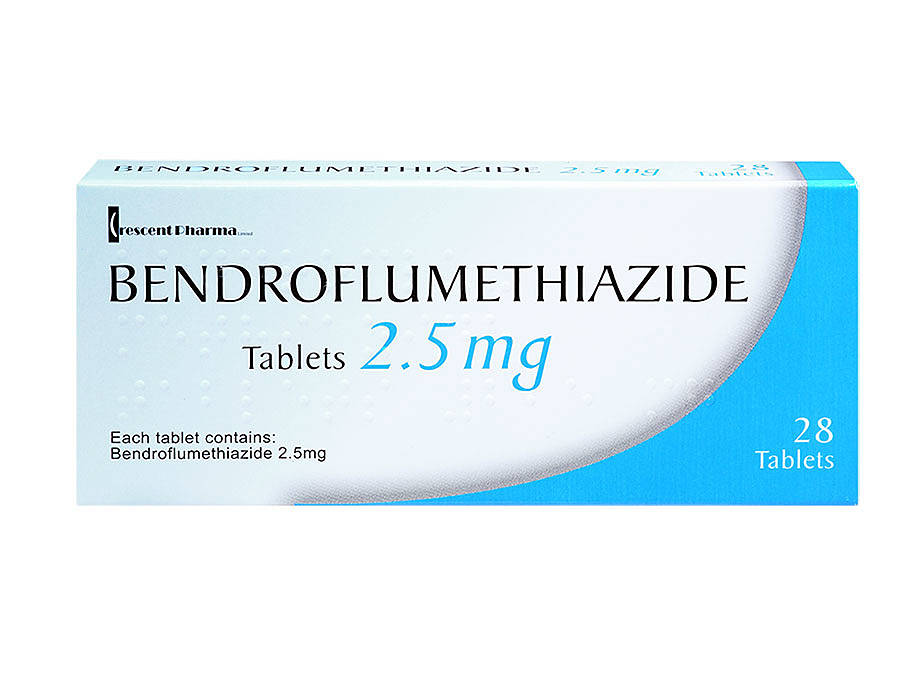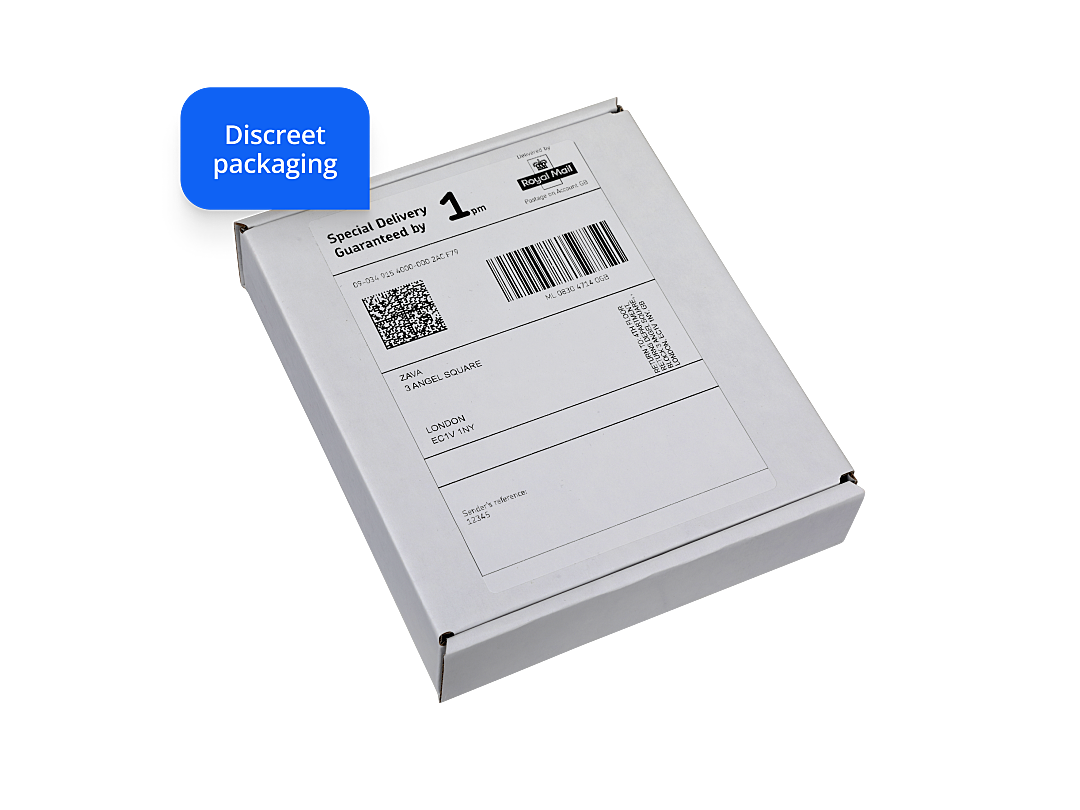Bendroflumethiazide
Request bendroflumethiazide online for high blood pressure with free, fast and discreet delivery




Prices from £19.99
In stock. Simply fill in a brief consultation questionnaire and one of our doctors will review your request today.
-
Bendroflumethiazide is a medication used to treat high blood pressure (hypertension). It comes in the form of a tablet that you take daily. The tablets can be given as a standalone treatment or in combination with certain other high blood pressure treatments. It can also be used to treat other conditions such as heart failure.
You can request a repeat prescription for bendroflumethiazide to treat hypertension through ZAVA.



About Bendroflumethiazide
-
-
Bendroflumethiazide is a medicine that’s taken to treat high blood pressure (hypertension). It works by reducing the amount of water and salt in the blood, helping the heart pump blood more easily around the body. This will make you pee more often.
This type of medication is called a diuretic. Bendroflumethiazide belongs to a group of drugs called thiazide diuretics.
-
-
Most adults can take bendroflumethiazide, but only if it’s been prescribed by a doctor. Children and babies can also take lower doses of bendroflumethiazide where a specialist has decided this is needed and is safe to prescribe.
ZAVA doctors will only offer bendroflumethiazide to patients who have already been prescribed it by their usual GP. It’s important that you keep going to your regular GP check-ups to monitor your blood pressure and blood tests.
You should not take bendroflumethiazide if you have:
- an allergy to any of the ingredients, or have had one in the past
- high levels of calcium in your blood
- severe liver or kidney problems
- symptoms of gout
- underactive adrenal glands (Addison’s disease)
- low levels of sodium or potassium in your blood
You’ll need to talk to a doctor about taking bendroflumethiazide if you have:
- difficulty peeing
- kidney problems
- diabetes
- liver disease
- an inflammatory condition called systemic lupus erythematosus
- an inherited blood disorder called porphyria
- had gout in the past
- any rare hereditary enzyme deficiencies or intolerances
- or drink alcohol to excess
Pregnancy and breastfeeding
If you’re pregnant or planning to get pregnant, talk to your GP about continuing bendroflumethiazide. This medication is generally avoided in pregnancy however your doctor can talk you through the benefits and risks of using this treatment during pregnancy with you.
Your safest treatment options will depend on how many weeks pregnant you are, and why you need to take bendroflumethiazide.
You should not take bendroflumethiazide if you’re breastfeeding. It can pass into your breast milk and also reduce the amount of breast milk you can produce. If you already take bendroflumethiazide you should discuss the risks and benefits of continuing this with your doctor.
Taking other medications with bendromethiazide
It’s best to talk to your doctor before taking bendroflumethiazide if you’re also taking medication for:
- heart or blood vessel problems
- asthma
- Parkinson’s disease
- epilepsy
- fungal infections
- depression or mental illness
- diabetes
- high cholesterol levels
- stomach ulcers
- gout
- bile acid problems
- low blood calcium or vitamin D
- steroids or sex steroids including combined contraceptives or hormone replacement therapy (HRT)
- cancer
- hormone imbalances
- muscle relaxation
- blood disorders
- pain
- glaucoma
- prevention of malaria
- tuberculosis (TB)
- sore throat
- infections (certain antibiotics)
- HIV
- allergy
- feeling sick (nausea) and being sick (vomiting)
- erectile dysfunction
Taking bendroflumethiazide and drinking alcohol may lower your blood pressure and make you feel dizzy or light headed.
-
-
Most people are prescribed 2.5mg of bendroflumethiazide a day to treat high blood pressure.
How much you take depends on:
- if you have any other medical conditions
- if you have kidney or liver problems
- if you’re taking any other medications
- if you’re elderly
- how well you respond to the medication
You should always take bendroflumethiazide exactly as your GP or specialist advises. In general it’s best to:
- swallow each tablet with a glass of water, with or without food
- take the tablet in the morning as it will make you pee more often
- take the tablet at the same time each day
What to do if you forget to take it
If you forget to take your bendroflumethiazide at your usual time, try to take it as soon as you remember.
If you don’t remember until late in the afternoon that day, just leave out the missed dose and carry on as normal.
What to do if you take too much
If you take too many bendroflumethiazide tablets talk to your GP straight away, contact 111, or go to your nearest A&E department. Take the medication with you so the doctor can see exactly what you’ve taken.
You will probably be dehydrated. You’re likely to feel thirsty, and may pee more often. You may also feel dizzy, have a slower or faster heartbeat, be confused, and in severe cases can be at risk of collapse or coma.
-
-
Side effects include:
- feeling thirsty or having a dry mouth
- peeing more often
- feeling dizzy
- feeling sick (nausea)
- being sick (vomiting)
- constipation
- diarrhoea
- loss of appetite
- a rise in the levels of uric acid, sugar, or fat in the blood
- erectile dysfunction
- muscle weakness and cramps
- headache
Rarer side effects include:
- skin rash
- blood problems which may show as bleeding or bruising easily, feeling tired or breathless, or getting more infections than usual
- increased sensitivity to sunlight
- severe and sudden stomach pain, which could be a sign of pancreas problems
- feeling itchy, having yellow-looking skin or whites of the eyes (jaundice), very dark wee or pale poo, possibly because of liver problems
- feeling more breathless, possibly due to lung problems
Stop the medication and contact a doctor or go to A&E immediately if you experience these symptoms.
In rare cases you may have an allergic reaction:
- a rash on your skin which is itchy, red, swollen, blistered, or peeling
- wheezing
- tightness in your chest or throat
- trouble breathing or talking
- your mouth, face, lips, tongue, or throat start swelling
- irritation or a build-up of fluid in the lungs making you breathless
Stop the medication and contact a doctor or go to A&E immediately if you experience any of these symptoms.
Always make sure to read your patient information leaflet and see a doctor if you suffer from any side effects.
-
-
If you have high blood pressure, there are two main methods of treating it – taking medication and making lifestyle changes.
Alternative medications
There are many prescribed drugs available to treat high blood pressure. In addition to diuretics, examples of the different types of high blood pressure medications include:
- angiotensin-converting enzyme (ACE) inhibitors
- angiotensin II receptor blockers (ARBs)
- beta blockers
- calcium channel blockers (CCBs)
- alpha blockers
About 50% of high blood pressure patients are treated with a single medication. The other 50% of patients are treated with a combination of two or three medications. Sometimes diuretics like bendroflumethiazide are taken in combination with CCBs or ACE inhibitors when a single medication is not effective enough to treat the problem.
Other thiazides, like indapamide, may be better suited to some patients starting a thiazide diuretic for blood pressure control for the first time but it’s important that you talk to your doctor to find the best treatment for you. This may vary depending on your:
- age
- ethnicity
- any other conditions you have
- other treatments you may be using
- cause(s) of your high blood pressure
Lifestyle changes
In addition to taking medication for treating high blood pressure, many people find that lifestyle changes help to control and maintain their blood pressure. This may include:
- stopping smoking
- losing weight, if you’re overweight
- eating a healthy, nutritious diet and reducing your salt, caffeine and alcohol intake
- exercising regularly

Dr Clair Grainger studied at The University of Edinburgh from 2004 to 2009. She's worked in hospitals throughout Edinburgh and London before completing her GP training in North Middlesex Hospital in 2017.
Meet our doctorsLast reviewed: 07 Oct 2019
-
BNF (2019). Bendroflumethiazide. [online]. Available at: https://bnf.nice.org.uk/drug/bendroflumethiazide.html [accessed 7 October 2019].
-
NHS (2018). Bendroflumethiazide. NHS. [online]. Available at: https://www.nhs.uk/medicines/bendroflumethiazide/ [accessed 7 October 2019].
-
NHS (2019). High blood pressure (hypertension). [online]. Available at: https://www.nhs.uk/conditions/high-blood-pressure-hypertension/treatment/ [accessed 7 October 2019].
-
NICE (2019). Hypertension in adults: diagnosis and management. [online]. Available at: https://www.nice.org.uk/guidance/ng136/chapter/Recommendations#choosing-antihypertensive-drug-treatment-for-people-with-or-without-type-2-diabetes [accessed 7 October 2019].
-
Crescent Pharma. Bendroflumethiazide 2.5mg. [online]. EMC. Available at https://www.medicines.org.uk/emc/files/pil.14971.pdf [accessed 29 April 2021].
In order to avoid related health risks, your blood pressure needs to be kept within the normal range. Because of this, you shouldn’t miss doses of your blood pressure treatment if possible. You reorder your treatment quickly and conveniently from ZAVA, to avoid running out.








